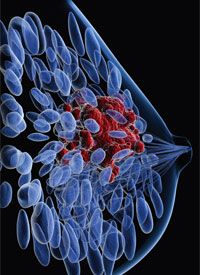- Advertise
- About OncLive
- Editorial Board
- MJH Life Sciences brands
- Contact Us
- Privacy
- Terms & Conditions
- Do Not Sell My Information
2 Clarke Drive
Suite 100
Cranbury, NJ 08512
© 2025 MJH Life Sciences™ and OncLive - Clinical Oncology News, Cancer Expert Insights. All rights reserved.
Abemaciclib Regimens Approved in Japan for Recurrent HR+/HER2- Breast Cancer
The Japanese Ministry of Health, Labor, and Welfare has approved abemaciclib (Verzenio) for the treatment of patients with HR-positive, HER2-negative unresectable or recurrent breast cancer in combination with fulvestrant (Faslodex) or an aromatase inhibitor.

The Japanese Ministry of Health, Labor, and Welfare has approved abemaciclib (Verzenio) for the treatment of patients with hormone receptor (HR)-positive, HER2-negative unresectable or recurrent breast cancer in combination with fulvestrant (Faslodex) or an aromatase inhibitor (AI), according to a statement by Eli Lilly, the manufacturer of the CDK4/6 inhibitor.
Additionally, the company received a positive opinion from the European Medicines Agency's Committee for Medicinal Products for Human Use in July 2018 supporting approval for the abemaciclib combinations in this patient population. Eli Lily expects to receive a decision from the European Commission in the next few weeks.
The FDA initially approved abemaciclib in combination with fulvestrant for patients with HR-positive, HER2-negative advanced breast cancer with disease progression following endocrine therapy in September 2017. The agency simultaneously approved the CDK4/6 inhibitor as monotherapy for patients with HR-positive, HER2-negative metastatic breast cancer who have previously received endocrine therapy and chemotherapy. In February 2018, abemaciclib was approved for use with an AI for the frontline treatment of postmenopausal women with HR-positive, HER2-negative advanced or metastatic disease.
The combination approvals were based on data from the phase III MONARCH 2 and 3 trials.1,2 In MONARCH 2, patients were randomly assigned to abemaciclib plus fulvestrant (n = 446) or fulvestrant plus placebo (n = 223). The study primarily included postmenopausal women (82%), with the remainder being pre- or peri-menopausal. For this group, patients received the gonadotropin-releasing hormone agonist goserelin throughout the trial and for at least 4 weeks prior to entering the study.
The median progression-free survival (PFS) was 16.4 months (95% CI, 14.4-19.3) in the abemaciclib arm versus 9.3 months (95% CI, 7.4-12.7) in the fulvestrant-alone group (HR, 0.553; 95% CI, 0.449-0.681; P <.0000001). The ORRs among patients with measurable disease were 48.1% and 21.3% in the abemaciclib and control arms, respectively.
The investigator-assessed ORR was 19.7% (95% CI, 13.3%-27.5%), with a median duration of response of 8.6 months. The independently reviewed ORR was 17.4% (95% CI, 11.4%-25.0%) with a median response duration of 7.2 months.
In MONARCH 3, the addition of abemaciclib to anastrozole or letrozole reduced the risk for progression or death by 46% compared with a nonsteroidal AI (NSAI) alone for previously untreated patients with HR-positive, HER2-negative advanced breast cancer.
The median PFS was 28.2 months (95% CI, 23.5 to not reached) in the abemaciclib arm versus 14.8 months (95% CI,11.2-19.2) with the NSAI alone (HR, 0.54; 95% CI, 0.418-0.698; P <.0001). In those with measurable disease, the objective response rate (ORR) was 55.4% with the CDK4/6 inhibitor and 40.2% in the control arm.
In the international, double-blind MONARCH 3 study, 493 postmenopausal women with locoregionally recurrent or metastatic breast cancer were randomly assigned to continuous abemaciclib at 150 mg twice daily (n = 328) or placebo (n = 165). All patients also received either 1 mg of anastrozole or 2.5 mg of letrozole once daily. Patients had not received prior system therapy for metastatic disease, although adjuvant endocrine therapy was permitted. The median follow-up was 17.8 months.
The median age in both groups was 63 years, and approximately 80% had measurable disease at baseline. The majority had a metastatic recurrence (55.5%-60%); however, nearly 40% of patients had de novo metastatic disease. Nearly 54% of patients had visceral disease and nearly 22% had bone-only disease. Additionally, close to half of patients had received a prior neoadjuvant or adjuvant endocrine therapy.
The ORR among patients with measurable disease after receiving abemaciclib comprised a complete response rate of 3.4% (9/267) and a partial response rate of 52.1% (139/267). The 40.2% ORR in the control arm consisted of all partial responses. The median duration of response was 27.4 months for the abemaciclib arm compared with 17.5 months in the control arm.
Diarrhea is one of the most common adverse events (AEs) associated with abemaciclib. In the MONARCH 3 trial, 81.3% of patients experienced this event, of which 9.5% was grade 3. In the MONARCH 2 trial, 86.4% of patients had all-grade diarrhea and 13.4% had a grade 3 event.
Diarrhea frequency was greatest during the first month of treatment with abemaciclib. Thirty-two percent of patients with grade 2 to 3 diarrhea experienced this event in the first cycle of treatment, in the MONARCH 2 trial. The median time to onset of diarrhea was 6 to 8 days, and the duration ranged from 6 to 11 days. For 13% to 22% of patients, a dose reduction or omission was required for management of diarrhea. Overall, 85% of diarrhea events recovered with supportive treatment.
References
- Sledge GW, Toi M, Neven P, et al. MONARCH 2: abemaciclib in combination with fulvestrant in patients with HR+/HER2- advanced breast cancer who progressed on endocrine therapy. J Clin Oncol 35, 2017 (suppl; abstr 1000).
- Di Leo A, Toi M, Campone M, et al. MONARCH 3: Abemaciclib as initial therapy for patients with HR+/HER2- advanced breast cancer. Presented at: 2017 ESMO Congress; Madrid, Spain; September 8-12, 2017. Abstract 236O_PR.
Related Content:




